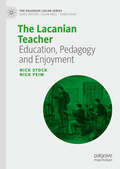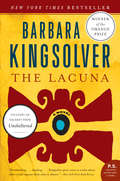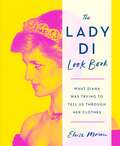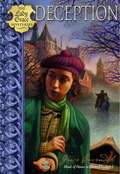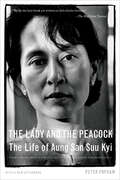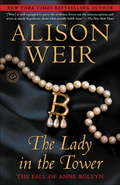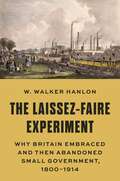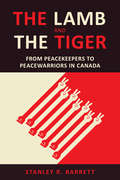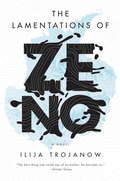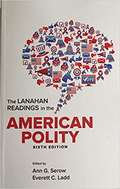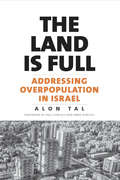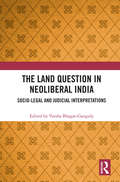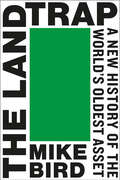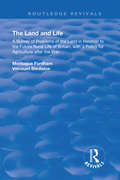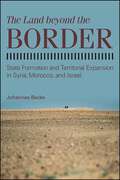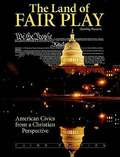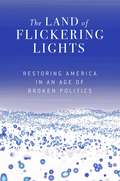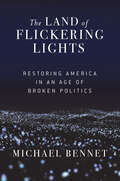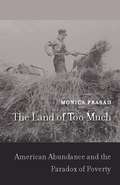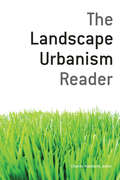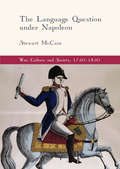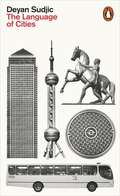- Table View
- List View
The Lacanian Teacher: Education, Pedagogy and Enjoyment (The Palgrave Lacan Series)
by Nick Peim Nick StockWhat does it mean to be a Lacanian teacher? This book responds through three avenues: what Lacan had to say about teaching, how Lacan taught his seminars, and what his theoretical ideas might have to say about teaching in general. The authors propose a rethinking of the teacher, the relationship between teacher and their fantasmatic educational landscape, a deconstruction of pedagogy, and a consideration of the teacher's enjoyment. An original understanding of the ontological dimension of education is proposed, along with an account of the implications this has for the thinking and being of a teacher. This book represents a valuable addition to the emerging body of Lacanian critical work in education and offers fresh insights for practitioners and scholars in the fields of education and psychoanalysis.
The Lacuna: Deluxe Modern Classic
by Barbara Kingsolver<P>In her most accomplished novel, Barbara Kingsolver takes us on an epic journey from the Mexico City of artists Diego Rivera and Frida Kahlo to the America of Pearl Harbor, FDR, and J. Edgar Hoover. The Lacuna is a poignant story of a man pulled between two nations as they invent their modern identities. <P>Born in the United States, reared in a series of provisional households in Mexico--from a coastal island jungle to 1930s Mexico City--Harrison Shepherd finds precarious shelter but no sense of home on his thrilling odyssey. Life is whatever he learns from housekeepers who put him to work in the kitchen, errands he runs in the streets, and one fateful day, by mixing plaster for famed Mexican muralist Diego Rivera. He discovers a passion for Aztec history and meets the exotic, imperious artist Frida Kahlo, who will become his lifelong friend. When he goes to work for Lev Trotsky, an exiled political leader fighting for his life, Shepherd inadvertently casts his lot with art and revolution, newspaper headlines and howling gossip, and a risk of terrible violence. <P>Meanwhile, to the north, the United States will soon be caught up in the internationalist goodwill of World War II. There in the land of his birth, Shepherd believes he might remake himself in America's hopeful image and claim a voice of his own. He finds support from an unlikely kindred soul, his stenographer, Mrs. Brown, who will be far more valuable to her employer than he could ever know. Through darkening years, political winds continue to toss him between north and south in a plot that turns many times on the unspeakable breach--the lacuna--between truth and public presumption. <P>With deeply compelling characters, a vivid sense of place, and a clear grasp of how history and public opinion can shape a life, Barbara Kingsolver has created an unforgettable portrait of the artist--and of art itself. The Lacuna is a rich and daring work of literature, establishing its author as one of the most provocative and important of her time. <P><b>Winner of the 2010 Orange Prize for Fiction</b>
The Lady Di Look Book: What Diana Was Trying to Tell Us Through Her Clothes
by Eloise Moran***Fashion writer Eloise Moran has studied thousands of pictures of Princess Diana over the past few years. Looking carefully at Diana's clothes, she discovered that behind each outfit lies a carefully crafted strategy. What Lady Di couldn't express verbally, she seemed to express through her clothes.With The Lady Di Look Book Eloise Moran takes us on a photographic journey celebrating Princess Diana's fashion choices over the years. From the pink gingham pants and pastel-yellow overalls of a sacrificial lamb - to the sexy Versace mini dresses, power suits, and cycling shorts of a free woman; this is an interpretation of Diana's most show stopping eighties and early nineties outfits and of course, her most fearless post-divorce revenge looks. Whether it's '80s cottagecore Diana, androgynous bow-tie Diana, little black dress Diana, or athleisure Diana - there is a look for everyone.Full of wit and humour, The Lady Di Look Book illuminates what a bold, and inspiring fashion icon Diana really was and shows that there's a bit of Diana in all of us.
The Lady Di Look Book: What Diana Was Trying to Tell Us Through Her Clothes
by Eloise MoranThrough a rich and beautiful series of images, British fashion journalist Eloise Moran decodes Princess Diana’s outfits in this smart visual psychobiography of an icon.From the pink gingham pants and pastel-yellow overalls of a sacrificial lamb, to the sexy Versace revenge dresses, power suits, and bicycle shorts of a free woman, British fashion journalist Eloise Moran has studied thousands of pictures of Princess Diana. She soon discovered that behind each outfit lay a carefully crafted strategy: What Lady Di couldn’t express verbally, she expressed through her clothes.Diana’s most show-stopping—and poignant—outfits are all here in The Lady Di Look Book, incisively decoded. Moran sees things no one has before: Why, for example, did Diana have a rotating collection of message sweatshirts? Was she mad for plaid, or did the tartan have a deeper meaning? What about her love of costume jewelry on top of the tiaras and oval sapphire engagement ring? With new interviews from some of the people who dressed Diana, Moran’s book is both a record of what Diana wore and why she wore it—and why we are still obsessed with Lady Di.From 1980s Sloane Ranger cottagecore Diana, to athleisure and Dynasty Di Diana, The Lady Di Look Book is both compulsively delightful and a full biography of the world’s most beloved royal.
The Lady Grace Mysteries
by Grace CavendishQueen Elizabeth is furious at the delays to the production of her new coin uaand so Lady Grace and her fellow Maids of Honour escape her bad temper and set off to skate on the frozen Thames. But their outing turns sour when a body is discovered on the banks uaa man blindfolded with coins on his eyes. Grace is sure something odd is going on and decides that, as the Queen's Lady Pursuivant, she should be the one to investigate. Along with her friends Ellie the laundrymaid and Masou the acrobat, she delves deep into a dangerous world of counterfeiting and corruption.
The Lady and the Peacock: The Life of Aung San Suu Kyi
by Peter PophamNobel Peace Prize Laureate Aung San Suu Kyi—known to the world as an icon for democracy and nonviolent dissent in oppressed Burma, and to her followers as simply “The Lady”—has recently returned to international headlines. Now, this major new biography offers essential reading at a moment when Burma, after decades of stagnation, is once again in flux.Suu Kyi’s remarkable life begins with that of her father, Aung San. The architect of Burma’s independence, he was assassinated when she was only two. Suu Kyi grew up in India (where her mother served as ambassador), studied at Oxford, and worked for three years at the UN in New York. In 1972, she married Michael Aris, a British scholar. They had two sons, and for several years she lived as a self-described “housewife”—but she never forgot that she was the daughter of Burma’s national hero.In April 1988, Suu Kyi returned to Burma to nurse her sick mother. Within six months, she was leading the largest popular revolt in the country’s history. She was put under house arrest by the regime, but her party won a landslide victory in the 1990 elections, which the regime refused to recognize. In 1991, still under arrest, she received the Nobel Peace Prize. Altogether, she has spent over fifteen years in detention and narrowly escaped assassination twice.Peter Popham distills five years of research—including covert trips to Burma, meetings with Suu Kyi and her friends and family, and extracts from the unpublished diaries of her co-campaigner and former confidante Ma Thanegi—into this vivid portrait of Aung San Suu Kyi, illuminating her public successes and private sorrows, her intellect and enduring sense of humor, her commitment to peaceful revolution, and the extreme price she has paid for it.
The Lady in the Tower: The Fall of Anne Boleyn
by Alison WeirBONUS: This edition contains a The Lady in the Tower discussion guide.Nearly five hundred years after her violent death, Anne Boleyn, second wife to Henry VIII, remains one of the world's most fascinating, controversial, and tragic heroines. Now acclaimed historian and bestselling author Alison Weir has drawn on myriad sources from the Tudor era to give us the first book that examines, in unprecedented depth, the gripping, dark, and chilling story of Anne Boleyn's final days.The tempestuous love affair between Henry VIII and Anne Boleyn scandalized Christendom and altered forever the religious landscape of England. Anne's ascent from private gentlewoman to queen was astonishing, but equally compelling was her shockingly swift downfall. Charged with high treason and imprisoned in the Tower of London in May 1536, Anne met her terrible end all the while protesting her innocence. There remains, however, much mystery surrounding the queen's arrest and the events leading up to it: Were charges against her fabricated because she stood in the way of Henry VIII making a third marriage and siring an heir, or was she the victim of a more complex plot fueled by court politics and deadly rivalry? The Lady in the Tower examines in engrossing detail the motives and intrigues of those who helped to seal the queen's fate. Weir unravels the tragic tale of Anne's fall, from her miscarriage of the son who would have saved her to the horrors of her incarceration and that final, dramatic scene on the scaffold. What emerges is an extraordinary portrayal of a woman of great courage whose enemies were bent on utterly destroying her, and who was tested to the extreme by the terrible plight in which she found herself. Richly researched and utterly captivating, The Lady in the Tower presents the full array of evidence of Anne Boleyn's guilt--or innocence. Only in Alison Weir's capable hands can readers learn the truth about the fate of one of the most influential and important women in English history.
The Laissez-Faire Experiment: Why Britain Embraced and Then Abandoned Small Government, 1800–1914
by W. Walker HanlonWhy Britain&’s attempt at small government proved unable to cope with the challenges of the modern worldIn the nineteenth century, as Britain attained a leading economic and political position in Europe, British policymakers embarked on a bold experiment with small and limited government. By the outbreak of the First World War, however, this laissez-faire philosophy of government had been abandoned and the country had taken its first steps toward becoming a modern welfare state. This book tells the story of Britain&’s laissez-faire experiment, examining why it was done, how it functioned, and why it was ultimately rejected in favor of a more interventionist form of governance.Blending insights from modern economic theory with a wealth of historical evidence, W. Walker Hanlon traces the slow expansion of government intervention across a broad spectrum of government functions in order to understand why and how Britain gave up on laissez-faire. It was not abandoned because Britain&’s leaders lost faith in small government as some have suggested, nor did it collapse under the growing influence of working-class political power. Instead, Britain&’s move away from small government was a pragmatic and piecemeal response—by policymakers who often deeply believed in laissez-faire—to the economic forces unleashed by the Industrial Revolution.
The Lamb and the Tiger: From Peacekeepers to Peacewarriors in Canada (UTP Insights)
by Stanley BarrettThis book focuses on the broad implications of the transformation of Canada from a peacekeeping to a war-making nation during the Conservative Party’s recent decade in power. Funds were poured into the Canadian Forces, and a newly militarized nation found itself entrenched in conflicts around the globe. For decades, Canada had played a leading role in UN peacekeeping, and when the Cold War ended, the prospect of international harmony was infectious. Yet in short order hostilities erupted in the failed states of Rwanda, Somalia, and the Balkans; terrorism – including 9/11 – raised its head; and Iraq and Afghanistan became war zones. In the face of these immense challenges, the UN was dismissed by its opponents as irrelevant. Structured around an anti-war perspective, The Lamb and the Tiger critically examines the ageless genetic and more recent cultural (civilizational) explanations of war, concluding with a close look at the impact of war and right-wing politics on women and Indigenous peoples. The Lamb and the Tiger encourages Canadians to think about what kind of military and what kind of country they really want.
The Lamentations of Zeno: A Novel
by Philip Boehm Ilija TrojanowA literary fiction about climate disaster and a scientist imploding on a journey to the AntarcticZeno Hintermeier is a scientist working as a travel guide on an Antarctic cruise ship, encouraging the wealthy to marvel at the least explored continent and to open their eyes to its rapid degradation. It is a troubling turn in the life of an idealistic glaciologist. <P><P>Now in his early sixties, Zeno bewails the loss of his beloved glaciers, the disintegration of his marriage, and the foundering of his increasingly irrelevant career. Troubled in conscience and goaded by the smug complacency of the passengers in his charge, he starts to plan a desperate gesture that will send a wake-up call to an overheating world. <P><P>The Lamentations of Zeno is an extraordinary evocation of the fragile and majestic wonders to be found at a far corner of the globe, written by a novelist who is a renowned travel writer. <P><P>Poignant and playful, the novel recalls the experimentation of high-modernist fiction without compromising a limpid sense of place or the pace of its narrative. It is a portrait of a man in extremis, a haunting and at times irreverent tale that approaches the greatest challenge of our age--perhaps of our entire history as a species--from an impassioned human angle.
The Lanahan Readings in the American Polity (Fifth Edition)
by Ann G. Serow Everett C. LaddThis book is designed to help undergraduates who are taking the basic American government course better understand their country's political system by providing essential readings on American ideas, constitutional system, core political institutions, public opinion, political competition, and policy debates.
The Lanahan Readings in the American Polity (Sixth Edition)
by Ann G. Serow Everett C. LaddThis collection continues to be the most comprehensive in coverage of the American political landscape, the most diverse in authorship, topic, and source, and the least expensive for students. The Lanahan Readings offers some of the best political writing, past and present.
The Land Is Full: Addressing Overpopulation in Israel
by Alon TalAn assessment of how Israel's extraordinary population growth undermines the country's environment, social equity, and quality of life--and what must be done about it During the past sixty-eight years, Israel's population has increased from one to eight million people. Such exponential growth has produced acute environmental and social crises in this tiny country. Alon Tal, one of Israel's foremost environmentalists, considers the ramifications of the extraordinary demographic shift, from burgeoning pollution and dwindling natural resources to overburdened infrastructure and overcrowding. Based on extensive fieldwork and interviews, the book examines the origins of Israel's population policies and how they must change to support a sustainable future.
The Land Question in Neoliberal India: Socio-Legal and Judicial Interpretations
by Varsha Bhagat-GangulyThis book examines the land question in neoliberal India based on a cohesive framework focusing on socio-legal and judicial interactions in a point of departure from the political-economy approach to land issues. It sheds light on several complex aspects of land matters in India and evolves a critical and multi-dimensional discourse by mapping out exchanges between social and political actors, the State, elites, citizenry, and the legal battle or judicial interpretations on land as right to property. Based on the themes of socio-legal policy and perspective on ‘land’ on the one hand and jurisprudence on the land question on the other, the volume discusses topics such as conclusive land titling; urban land governance; governance of forest land; land-leasing practices, policies, and interventions from the perspective of women; land acquisition policies and laws; how land matters interface with environmental issues; and judicial debates on ‘compensation’ against land acquisitions. It covers a wide range of case studies from all over India by bringing together specialists from across backgrounds. Comprehensive and topical, this book will be useful to scholars and researchers of development studies, political studies, law, sociology, political economy, and public policy, as well as to professionals in NGOs, civil society organisations, think tanks, planning and public administration, lawyers, civil services and training institutes, and judicial and forest academies. Those working on rural and urban land issues in India, land management, land governance, environmental laws and governance, property rights, resource conflicts, social work, and rural development will find this book to be of special interest.
The Land Trap: A New History of the World's Oldest Asset
by Mike BirdHow the world&’s oldest asset secretly shapes our modern economyIn The Land Trap, Mike Bird—Wall Street editor at The Economist—reveals how this ancient asset still exerts outsize influence over the modern world. From the speculative land grabs of colonial America to China's real estate crisis today, Bird shows how fortunes are built—and destroyed—on the bedrock of land.Tracing three centuries of history, Bird explores how land quietly became the linchpin of the global banking system, driving everything from soaring housing prices to rising geopolitical tensisons. As governments wrestle with inequality and land grows ever scarcer, The Land Trap offers a powerful new framework for understanding the hidden force behind today's most urgent challenges. This is the book for anyone who wants to see beyond markets and money to the real game being played on a foundation as old as civilization itself. Timely, provocative, and essential, The Land Trap will change how you see the ground beneath your feet.
The Land and Life: An Analysis of Problems of the Land in Relation to the Future of English Rural Life with a Policy for Agriculture After the War (Routledge Revivals)
by Montague FordhamOriginally published in 1942, the Rural Reconstruction Association had been working on the rural problem in its various aspects for several years. This republished volume represented the conclusions reached in the face of the urgent problems of war and reconstruction, and outlines a policy based on the widest interests of the nation as a whole. The book contains chapters on policy in the past and present, the post-war policy, and the opposition and support to the policies outlined.
The Land beyond the Border: State Formation and Territorial Expansion in Syria, Morocco, and Israel (SUNY series in Comparative Politics)
by Johannes BeckeBased on three case studies from the Middle East, The Land beyond the Border advances an innovative theoretical framework for the study of state expansions and state contractions. Johannes Becke argues that state expansion can be theorized according to four basic ideal types—a form of patronage (patronization), the imposition of a satellite regime (satellization), the establishment of territorial exclaves (exclavization), or a full-fledged takeover (incorporation). Becke discusses how both irredentist ideologies and political realities have shaped the dynamics of state expansion and state contraction in the recent history of each state. By studying Israel comparatively with other Middle Eastern regimes, this book forms part of an emerging research agenda seeking to bring the research fields of Israel Studies and Middle East Studies closer together. Instead of treating Israel's rule over the occupied territories as an isolated case, Becke offers students the chance to understand Israel's settlement project within the broader framework of postcolonial state formation.
The Land of Fair Play (Third Edition): American Civics from a Christian Perspective
by Geoffrey ParsonsThis U.S. civics text, updated in 2008, provides students information regarding how our local, state, and federal governments work. The primary emphasis is providing young people with the knowledge they need to intelligently exercise their citizenship responsibilities. The appendix includes a copy of the Constitution and information about Christian principles of civil government.
The Land of Flickering Lights: Restoring America in an Age of Broken Politics
by Michael BennetThe Land of Flickering Lights is a unique contribution to American political writing at this or any other time. Senator Michael Bennet lifts a veil on the inner workings of Congress to reveal, in his words, "through a series of actual stories--about the people, the politics, the motives, the money, the hypocrisy, the stakes, the outcome--the pathological culture of the capital and the consequences for us all." <P><P> Bennet unfolds the dramatic backstory behind five episodes crucial to the well-being of all Americans. Each of them exemplifies the hyper-partisan politics that have upended our democracy: <P><P> The highly politicized confirmation battles over judicial nominations at all levels--epitomized by ugly and unprincipled fights over seats on the Supreme Court; The passage of the Trump tax law, which massively increased our national debt and widened economic inequality across the country; The shredding of the Iran nuclear deal, which undermined our national security, caused friends and foes alike to doubt America's word, and made a mockery of the longstanding bipartisan tradition in foreign policy; The pervasive corruption unleashed by "dark money" in policies and how big donors have been able to stymie urgent action on climate change and many other issues; The sabotage by a congressional minority of the "Gang of Eight's" bi-partisan deal to reform America's immigration policies, a deal that would have comprehensively addressed the immigration issues that bedevil us to this day. With frankness and refreshing candor, and in elegant prose, Bennet pulls the machinations behind these episodes into full public view, shedding vital new light on our political dysfunction today. Arguing that each of us has a duty to act as a founder, he will inspire Americans of all political persuasions to demand that the "winners" of our political battles be all the American people, nor one party or the other.
The Land of Flickering Lights: Restoring America in an Age of Broken Politics
by Michael BennetThe Colorado Senator offers “a sweeping diagnosis of the nation’s political ills . . . stitched together with assurances that room for redemption still exists” (New York Times Book Review).In The Land of Flickering Lights, Senator Michael Bennet lifts a veil on the inner workings of Congressional politics to reveal, in his words, “a series of actual stories—about the people, the politics, the motives, the money, the hypocrisy . . .” each of which demonstrates “the pathological culture of the capital and the consequences for us all.”Bennet unfolds the dramatic backstories behind the highly politicized confirmation battles over judicial nominations at all levels; the passage of the Trump tax law; the shredding of the Iran nuclear deal; the pervasive corruption unleashed by the influence of “dark money”; and the sabotage by a congressional minority of the “Gang of Eight’s” bi-partisan deal to reform America’s immigration policies.With frankness and refreshing candor, Bennet pulls the machinations behind these episodes into full public view, shedding vital new light on today’s political dysfunction. Arguing that each of us has a duty to act as a founder, he calls on Americans of all political persuasions to demand that the “winners” of our political battles be all the American people, nor one party or the other.
The Land of Too Much
by Monica PrasadThe Land of Too Much presents a simple but powerful hypothesis that addresses three questions: Why does the United States have more poverty than any other developed country? Why did it experience an attack on state intervention starting in the 1980s, known today as the neoliberal revolution? And why did it recently suffer the greatest economic meltdown in seventy-five years? Although the United States is often considered a liberal, laissez-faire state, Monica Prasad marshals convincing evidence to the contrary. Indeed, she argues that a strong tradition of government intervention undermined the development of a European-style welfare state. The demand-side theory of comparative political economy she develops here explains how and why this happened. Her argument begins in the late nineteenth century, when America’s explosive economic growth overwhelmed world markets, causing price declines everywhere. While European countries adopted protectionist policies in response, in the United States lower prices spurred an agrarian movement that rearranged the political landscape. The federal government instituted progressive taxation and a series of strict financial regulations that ironically resulted in more freely available credit. As European countries developed growth models focused on investment and exports, the United States developed a growth model based on consumption. These large-scale interventions led to economic growth that met citizen needs through private credit rather than through social welfare policies. Among the outcomes have been higher poverty, a backlash against taxation and regulation, and a housing bubble fueled by “mortgage Keynesianism. ” This book will launch a thousand debates.
The Landscape Urbanism Reader
by Charles WaldheimIn The Landscape Urbanism Reader Charles Waldheim—who is at the forefront of this new movement—has assembled the definitive collection of essays by many of the field's top practitioners. Fourteen essays written by leading figures across a range of disciplines and from around the world—including James Corner, Linda Pollak, Alan Berger, Pierre Bolanger, Julia Czerniak, and more—capture the origins, the contemporary milieu, and the aspirations of this relatively new field. The Landscape Urbanism Reader is an inspiring signal to the future of city making as well as an indispensable reference for students, teachers, architects, and urban planners.
The Language Question under Napoleon
by Stewart McCainThis book offers a new perspective on the cultural politics of the Napoleonic Empire by exploring the issue of language within four pivotal institutions - the school, the army, the courtroom and the church. Based on wide-ranging research in archival and published sources, Stewart McCain demonstrates that the Napoleonic State was in reality fractured by disagreements over how best to govern a population characterized by enormous linguistic diversity. Napoleonic officials were not simply cultural imperialists; many acted as culture-brokers, emphasizing their familiarity with the local language to secure employment with the state, and pointing to linguistic and cultural particularism to justify departures from which what others might have considered desirable practice by the regime. This book will be of interest to scholars of the Napoleonic Empire, and of European state-building and nationalisms.
The Language of Cities
by Deyan SudjicThe director of the Design Museum defines the greatest artefact of all time: the cityWe live in a world that is now predominantly urban. So how do we define the city as it evolves in the twenty-first century? Drawing examples from across the globe, Deyan Sudjic decodes the underlying forces that shape our cities, such as resources and land, to the ideas that shape conscious elements of design, whether of buildings or of space. Erudite and entertaining, he considers the differences between capital cities and the rest to understand why it is that we often feel more comfortable in our identities as Londoners, Muscovites, or Mumbaikars than in our national identities.
The Language of Contention
by Sidney TarrowThis book examines the relations between the material and political bases of contentious politics and the construction, diffusion and endurance of contentious language. Beginning with the language of revolution developed from the seventeenth to the nineteenth centuries, it examines contentious language at work, in gender and race relations and in nationalist and ethnic movements. It closes with an examination of emotions in contentious politics, reflecting on the changes in political language since 9/11 and assessing the impact of religion and recent innovations in electronic communication on the language of politics.
